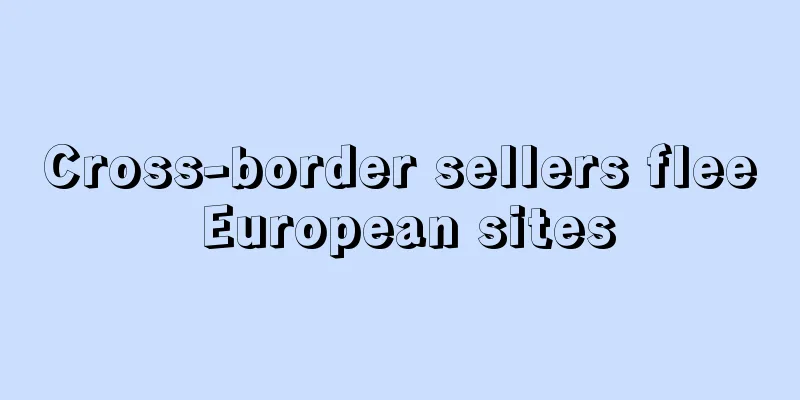Amazon's new rules will take effect, and accounts will be frozen if they fail to comply

|
In April this year, Amazon Europe released a new regulation. Now there are only two days left before the new regulation is implemented. Amazon will take action against non-compliant sellers, so sellers must hurry up to complete the compliance requirements. It is worth noting that not only sellers but also freight forwarders are affected by this wave of new regulations.
Effective October 1, sales restrictions will apply for non-compliance
Amazon's compliance process continues to move forward. Sellers have not yet recovered from the recent UK VAT incident, and a new compliance policy will soon be implemented.
In April this year, Amazon Europe released the following announcement:
The announcement stated that before October 1, European sellers must provide relevant information in compliance with the 7th Amendment to the Administrative Cooperation Directive (DAC7).
According to DAC7, all e-commerce platforms operating in the EU, including eBay, Amazon, etc., must report information on platform sellers to the tax authorities of relevant member states, including VAT or tax data and financial data.
Therefore, Amazon requires sellers who reside in the EU and have annual sales of ≥ 2,000 euros or ≥ 30 completed orders to provide or confirm the information required by DAC7 within the specified time. If the specified conditions are not met before October 1, once the conditions are met, the required information must be provided or confirmed within 60 days of receiving the first notification from Amazon.
The announcement emphasized that if the seller meets the conditions but fails to comply with the requirements, Amazon will freeze his account and withhold funds until the seller provides the required information and passes the database verification of the competent authority.
It is reported that Amazon has provided a link for uploading missing information and confirming existing information in the third quarter. However, the information that individual sellers and corporate sellers need to report is different. The identity information of individual sellers includes: surname and first name, date of birth, place of birth (in the absence of TIN), main address, value-added tax (VAT) identification/registration number (if applicable), and any taxpayer identification number issued, plus the member state of issuance. The identity information of corporate sellers includes: legal name, company registration number, main address, value-added tax (VAT) identification/registration number (if applicable), any taxpayer identification number issued and each member state that issued the relevant number, as well as any permanent establishments that carry out relevant activities in the European Union in addition to the main address.
The condition of DAC7 is that the individual or legal person is an EU resident, but industry insiders say that Amazon has over-implemented the directive, that is, as long as the entity is in the EU, no matter where the legal person is, it will be affected. Therefore, if the seller's company is located in any of the 27 EU member states, it needs to implement the directive.
The new regulations are about to be implemented, sellers should keep these points in mind
In addition to collecting information such as tax identification numbers from affected sellers, Amazon must perform two other operations to comply with DAC7: one is to verify the information, including verification against the databases of the respective authorities. The second is to report the sellers' data as well as the consideration received, fees charged to them and bank details.
What is DAC7?
DAC7, also known as the EU Tax Transparency Act, is a tax regulation enacted by the European Union (EU) and is part of the EU's tax cooperation framework. It aims to enhance tax transparency and tax compliance. It stipulates that online shopping malls in the EU (such as Amazon and Ebay) must share information about platform sellers with the tax authorities of relevant member states from 2023.
Tax compliance has become a general trend, but DAC7 sellers still have some questions to be answered.
Q: If my address is in the EU but my products are not sold in the EU, will it be affected?
A: As long as the address is in the EU, no matter which market the product is sold in, it will be affected. For example, if a seller's products are only sold in the United States, but he lives in Italy, then the seller will also need to report for verification.
Q: My main address is in Germany, but the stores on the French, Spanish and German sites all meet the specified conditions. Do I need to add the information three times?
A: No. The EU is considered a single store, so you only need to add the necessary information once in your EU Seller Central account.
Q: I live in Germany, but my stores in France and Mexico meet the required conditions. How many times do I need to add information?
A: Twice. Once in the Mexican Seller Central account and once in the EU Seller Central account. If the seller only adds the EU information and not the Mexican one, the Mexican account will not be compatible. The offending account in Mexico will be deactivated and funds will be withheld.
Q: Will there be any impact if only one of the two thresholds is exceeded?
A: Yes. If you complete 30 or more transactions in a year, or if your sales exceed 2,000 Euros, you must provide the above data information.
European tax compliance is increasing, and both sellers and freight forwarders are hurt
The implementation of the new regulation is bound to affect those Amazon sellers who rely on local European companies for tax avoidance. In order to protect their profits, many sellers do not want to give up their local European accounts. Therefore, someone proposed a plan to set up a company in Northern Ireland, which still retains the rights of an EU member, and use the account of the Northern Irish company to operate Amazon's EU sites, so as to avoid the impact of DAC7.
However, tax compliance in Europe is the general trend. This method is not a long-term solution after all. There will be more similar policies in the future. If you avoid it this time, there will be next time. Compliance operation is the long-term way.
Europe has been conducting strict tax inspections this year. The "Liege Airport Incident" in March this year was triggered by tax issues. At that time, Belgium arrested four suspects, and the gang caused tax evasion losses of up to 310 million euros.
The EU Customs once accused some countries in a white paper of relaxing import policies for the sake of their own economies, causing economic losses to the EU. Belgium is one of the "certain countries" mentioned.
In fact, the increased compliance with European tax regulations will hurt not only sellers, but also freight forwarders, because the "double-clearance tax package" service they launched is to make profits through tax avoidance. After the new regulations come into effect, it will be difficult for sellers to escape the fate of paying taxes, and in this case, the business volume of freight forwarders will inevitably be affected.
Now, both the destination market and the platform are emphasizing compliance operations. In the process of Amazon promoting platform compliance, the biggest impact on Chinese cross-border e-commerce sellers must be the "account blocking wave" in 2021, when tens of thousands of Chinese sellers were affected. This time, it cooperated with the EU to enforce taxation, and I don't know how many sellers will be affected again. I hope that sellers will pay more attention to compliance operations in the future. |
<<: Many sellers have started to lose reviews! The second review is also coming!
>>: A seller born after 1995 discovered a niche category and made 300 million yuan a year!
Recommend
Shipments in the first quarter reached 1.89 million units! Korea's PC market is experiencing growth
Affected by the epidemic, the South Korean govern...
What is Neiman Marcus? Neiman Marcus Review, Features
Neiman Marcus is a high-end department store chain...
From 0 to 1 million US dollars, shein sellers took only three months
The brand with the highest number of searches on ...
What is Shpock? Shpock Review, Features
Shpock is an app that mainly sells second-hand pr...
From the post-50s to the post-00s, Alibaba International Station merchants collectively face the foreign trade peak season in March
In March, domestic foreign trade enterprises ushe...
Search volume soared 4378%, another product unexpectedly became popular on Amazon!
TikTok makes super glue popular, and sales on Ama...
Omicron will bring a new spring to European e-commerce
Small businesses in Europe will once again conduc...
What is FasterPay? FasterPay Review, Features
<span data-docs-delta="[[20,{"gallery"...
What is Amazon Smile Logo Infringement? Amazon Smile Logo Infringement Review, Features
Many Amazon sellers have violated Amazon's tr...
500 million products sold! Third-party sellers became the main force of Black Friday and Cyber Monday
According to foreign media reports, during the Bl...
Hangzhou's cross-border e-commerce has doubled in ten years. Cainiao's overseas warehouses help cross-border "hidden champions" overcome the problem of large-scale overseas shipments
In Hangzhou, in addition to the six big players, ...
What is Tico Roasters? Tico Roasters Review, Features
Tico Roasters is a coffee maker and tea website th...
Pampered Chef invests in new technology to enhance its online shopping efforts
Pampered Chef, which sells cookware , kitchen too...
There is a huge demand for coffee equipment, and this market deserves attention
Before the COVID-19 pandemic , Canadians liked to...
What is Dajia ERP? Dajia ERP Review, Features
Dajia ERP is an "integrated business service&...









